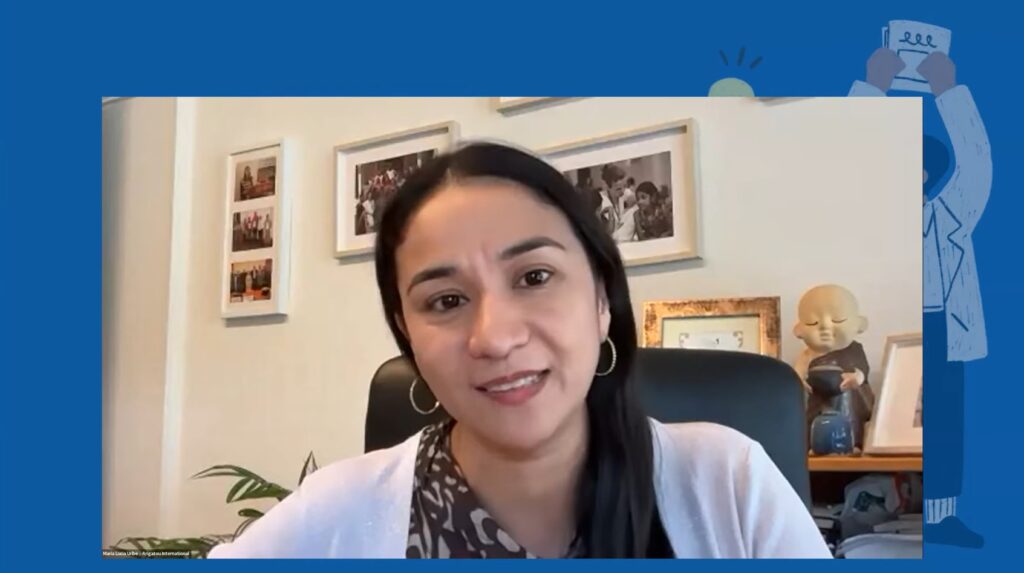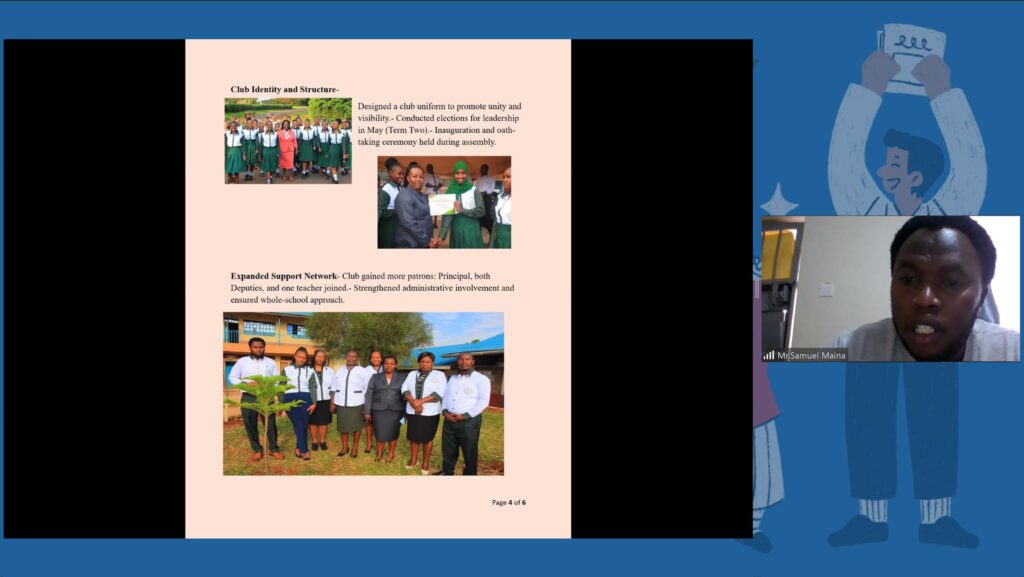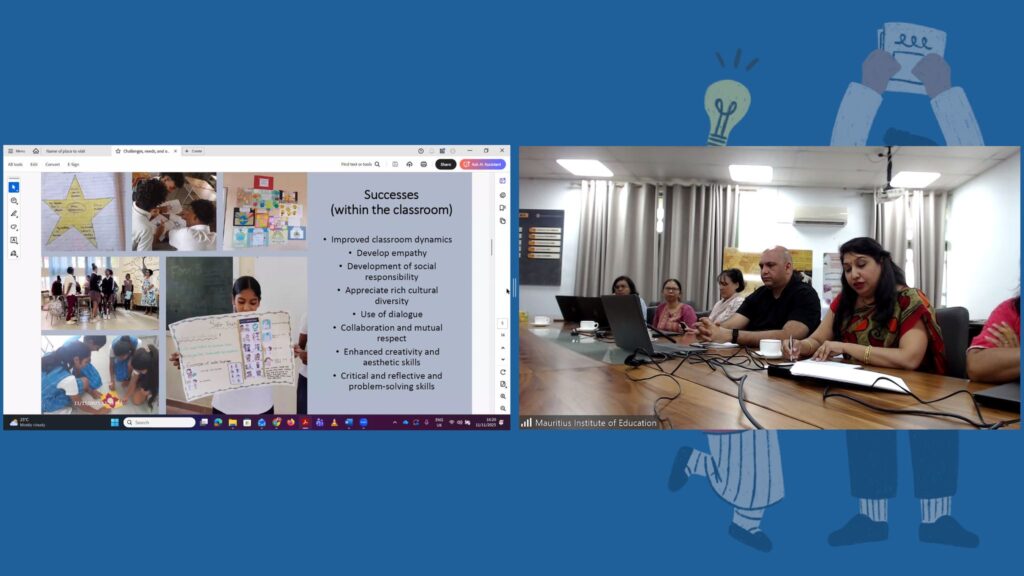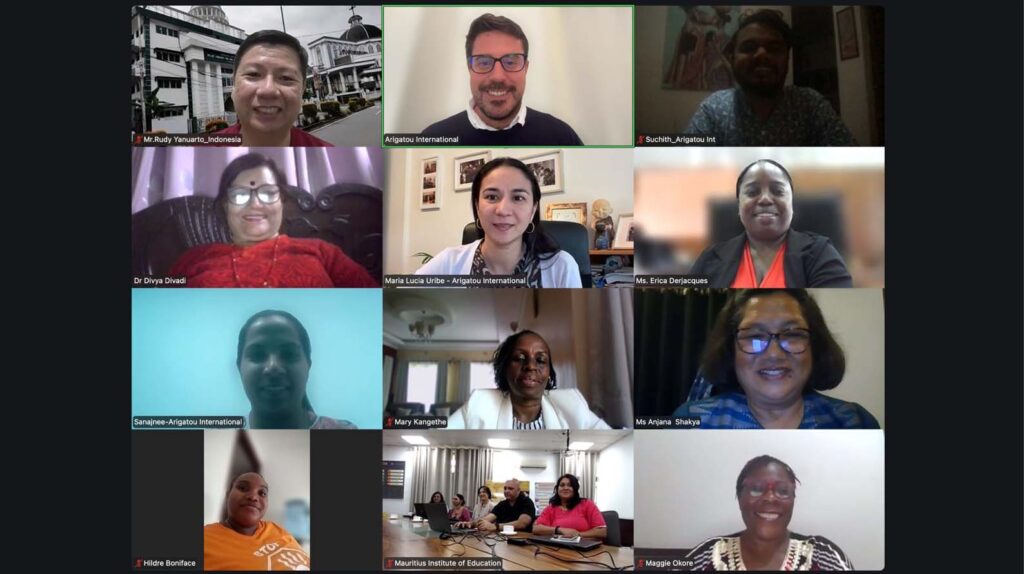On 11 November 2025, educators, policymakers, and partners from six countries came together for the webinar “We Are Transforming Education: National Examples to Promote and Integrate Ethics Education – Successes, Challenges, and Opportunities,” to share how they are reshaping national education systems through the Ethics Education Fellowship program.
The Fellowship is a collaborative initiative, implemented since 2022 with six ministries of education: Bangladesh, Indonesia, Kenya, Mauritius, Nepal, and Seychelles. Its goal is to integrate ethics education into national education systems, helping children grow as empathetic, responsible, and engaged citizens. It utilizes the Ethics Education Approach, which is based on intercultural and interfaith learning and dialogue, fostering critical thinking, ethical reflections and mutual understanding.
Ms. Maria Lucia Uribe, Executive Director of Arigatou International, opened the session, highlighting the crucial role of ministries of education in making change last. “We are shaping not only lessons, but relationships, school cultures, and social dynamics. We are, in essence, re-grounding education in human dignity,” she said.

The Ethics Education Fellows, who lead the program in each country, together with other representatives, shared key achievements, innovations, and lessons learned from their journeys of integrating ethics education at the national level.
Bangladesh
In Bangladesh, the program has gained strong momentum, expanding its reach to 42 schools and centering on five learning themes: self-awareness, dialogue, problem-solving, community engagement and respect for diversity.
Dr. A.Q.M. Shafiul Azam, Director of the Planning and Development Wing at the Directorate of Secondary and Higher Education, described how ethics education is being institutionalized in the country’s systems: teacher-training manuals, curricula and education policy. By embedding the approach in official materials, he said, the work is aligning with national goals for quality education and peacebuilding.
Indonesia
With over 1,400 teachers and 10,000 students directly involved, and dissemination reaching more than 22,000 educators, what began as a pilot has become a national movement. Indonesia’s program aligns with its curriculum reforms and draws from local cultural wisdom, in particular with its Pancasila profile and habituation learning.
“We try to engage parents, local government, universities, and communities to bring ethics education into a shared movement that connects school life with community values,” said Mr. Rudy Januarto, Principal of Karia Yosef Kindergarten.
Kenya
Representing Kenya, Dr. Ndegwa Gichuhi, Director of Policy, Partnerships and East African Affairs, and Ms. Mary Kangethe, Director of the Education Programme at the Kenya National Commission for UNESCO, explained how ethics education is being woven into national priorities. By aligning the program with competency-based education and Global Citizenship Education, and by using digital platforms and peer-learning networks, Kenya is integrating ethics into teacher professional development and curriculum planning.
On the ground, teachers are already seeing the impact: Mr. Samuel Maina of St. Annuarite Gatanga Secondary School said the program “has promoted respect and harmony. It has helped our students reduce conflict within the school. We have nurtured responsible students who now act with fairness and a sense of service.”

Mauritius
Ms. Mila Devi Sewruttun Doseiah, Director of the Mauritius Institute of Education, described a steady shift as ethics education is woven into life skills and social studies. Classroom discussions and community outreach are starting to foster greater empathy and intercultural understanding among students. “The emphasis on mutual respect and equitable participation has changed classroom dynamics, positioning students as co-creators of ethical knowledge rather than passive recipients,” she said.
Looking ahead, plans include launching ethics education clubs and short courses for educators to build long-term sustainability.

Nepal
Dr. Divya Diwadi, Deputy Secretary-General of the National Commission for UNESCO, explained that Nepal has integrated ethics education into teacher guides and curricula, with direct budget allocations from provincial governments demonstrating strong institutional commitment. The program has reached multiple districts and led to measurable improvements in students’ behavior, especially in respect, inclusion, and civic engagement.
Ms. Anjana Shakya, Chairperson of Himalayan Human Rights and actively involved in the Monitoring, Evaluation, and Learning process, shared powerful, heartening stories of students and teachers forging new friendships, challenging old assumptions, and creating more inclusive classroom dynamics. She described one school where pupils had previously sat apart by caste, religion, or gender; after participating in the program, they formed friendships across those divides and began spending more time together, becoming noticeably closer.
Seychelles
“Institutionalization has been one of our biggest achievements,” stated Ms. Erica Derjacques-Inacio, Director General of the Curriculum Leadership & Implementation Division, Education Services Department, Ministry of Education.
This year, ethics education was successfully integrated into personal and social studies as well as religious education. The country also developed a new diploma program at the Seychelles Institute of Teacher Education and produced two new learning modules. Ms. Derjacques-Inacio emphasized that teachers are reporting stronger student values, enhanced critical thinking, and more inclusive school cultures.
Two teachers enriched the discussion by sharing experiences from their classrooms. “In my school, ethics education has helped students develop values such as respect, honesty and compassion,” said Ms. Hildre Boniface. “It has encouraged them to think critically about moral issues and to make responsible choices in their daily lives.” “My greatest reward,” added Ms. Sharon Fredric, “is seeing my students grow in confidence.”

Across all six countries, teachers are seeing the same results: children are more empathetic, responsible, and aware of the issues that affect their communities. Classroom lessons are becoming real-world experiences rooted in dialogue, reflection, and service.
Dr. Margaret Okore from the Association for the Development of Education in Africa (ADEA) concluded:
“Transforming education is not just about systems; it is about people. It is about the choices we make, the examples we set, and the values we live by. When integrity guides leadership, when empathy informs teaching, and when learners are empowered to act with courage and conscience, then, and only then, will transformation be complete.”
The event was organized by the Ethics Education Fellowship partners: Arigatou International, the Guerrand-Hermès Foundation for Peace, Human Fraternity, KAICIID, and UNESCO, in collaboration with the six participating Ministries of Education, teacher training institutions, and UNESCO national commissions. Special thanks go to the Fellows for their unwavering commitment to children’s wellbeing and peacebuilding.